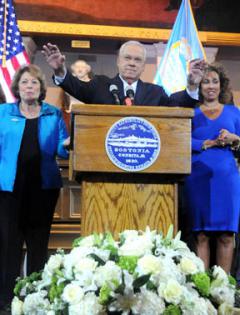April 3, 2013
 Mayor Tom Menino announces he will not run: Flanked by wife Angela, left, and daughter Susan. Photo by Don Harney/Mayor's OfficeTom Menino’s emotional announcement in Faneuil Hall last week brought even the most battle-scarred ward and precinct captains to tears. After a 20-year run— most of it stellar— the Readville resident will step out of the ring later this year.
Mayor Tom Menino announces he will not run: Flanked by wife Angela, left, and daughter Susan. Photo by Don Harney/Mayor's OfficeTom Menino’s emotional announcement in Faneuil Hall last week brought even the most battle-scarred ward and precinct captains to tears. After a 20-year run— most of it stellar— the Readville resident will step out of the ring later this year.
It’s the right decision. Slowed by a flurry of health issues, the mayor has aged demonstrably in the last several months. His mental vigor and political acumen seem unfazed— but his capacity to keep to a Menino clock is undermined by a healing, but still-frail frame.
It’s a bittersweet end to a mayoral tenure that some viewed as improbable from the start. But it’s softened by the awareness that Menino will remain in office through the end of the year— with a free hand to finalize policies and plan his own, productive future. Citizen Menino has the potential to be as influential in retirement as he currently is in “power”— buoyed by the conventional wisdom, shared here, that he would not have been defeated in this fall’s balloting had he sought a sixth term.
He will need to pick his battles, but Tom Menino, the former mayor, could well triumph in ways that he could not as incumbent, who must worry about balancing constituencies and alliances against his own goals. Beloved by his neighbors and respected for his progressive political stands, the mayor — freed from the necessity of riding herd on the minutiae of an entire city—could drive home a singular issue like no other power-broker in town. Whether it be early childhood education, the continuing drumbeat of youth violence, or chronic obesity— Menino can be a champion on one or all of them in sequence.
From the Dorchester lens, Menino benefited from an interim incumbency to beat a favorite son— then State Rep. Jim Brett— in 1993. But the mayor showed a deft hand in quickly winning over former foes with kindness rather than vengeance for their fealty to a friend. When he — or someone in his administration – stumble on a local issue, he has displayed a willingness to walk it back— even if he is loathe to admit a setback. Unlike some people in his business, Menino learned to be a happy warrior and understood that politics— to paraphrase Jefferson biographer Jon Meacham— is kaleidoscopic: the morning’s foe may well prove to be the evening’s critical ally.
It’s not to say that the mayor can’t be a fearsome opponent. But, in our experience at least, he was not ruthless. Even when we were at odds with the mayor on specific issues— as we have been on occasion— he did not abuse his power to inflict injury. Sharp words could be exchanged, to be sure, in the heat of a disagreement. It’s likely most people in Faneuil Hall last week had their share of biting words with the mayor in the course of their careers.
But Tom Menino had an instinct— that frequently prevailed— to seek to repair hurt feelings, find common interests, and move on. It was a trait that suited a man of power: to understand that the city would function best without the burden of long-lingering animosities.
The jolt of his decision to move off the mayoral stage next year has a seismic quality. It’s hard to fathom that anyone will replicate Menino’s authentic connection with people across all neighborhoods in quite the same way. The Menino era has been one of tremendous growth and success in most sectors. There’s an uneasiness in seeing him passing the torch, even though it had to happen inevitably.
But, it’s a fitting tribute to Menino that he has the wisdom to allow the next person to do so on his or her own terms— and to permit the process of choosing his successor to unfold without his long shadow standing in the way.
Then, Menino can move on to his next, well-deserved phase of public service: the grand statesman, Franklin-esque in stature, a founding father of modern Boston. In that sense it marks the start, not an ending.
Thank you, Mayor, for doing it your way— the right way.
Topics:


